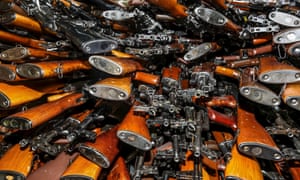Developing nations were once again the largest buyers of weapons as total sales dropped to $80bn from $89bn in 2014

The sale of global arms dropped slightly last year to $80bn from 2014’s $89bn, according to a new congressional study, with the US maintaining its position as the world’s dominant supplier.
But at $40bn the US market share of weapons sales amounted to about half of all arms agreements in 2015, and more than double the orders recorded by France, its nearest rival with $15bn in sales. The US and France both grew their market shares, by around $4bn and $9bn respectively.
Russia recorded a slight decline in arms orders, dropping to $11.1bn in sales from its $11.2bn total in 2014, while China reached $6bn, double the previous year’s estimates.
The latest figures were released last week by the Congressional Research Service, a division of the Library of Congress, and are considered one of the most reliable measures of the global arms trade.
US arms exports in 2016 looks set to remain broadly in line with the previous year’s sales.
Last month, the Defense Security Cooperation Agency (DSCA), the Pentagon agency that handles foreign sales, announced weapons sales of $33.6bn for 2016. The figure did not included deals for fighter jets to Kuwait, Qatar and Bahrain valued at $7bn that for accounting purposes will be rolled in 2017 sales.
The 2015 study, titled Conventional Arms Transfers to Developing Nations, 2008-2015, found that developing nations continued to be the largest buyers of arms.
The largest such buyers in 2015 were Qatar, which signed deals for more than $17bn in weapons; Egypt, which agreed to buy almost $12bn; and Saudi Arabia, which spent over $8bn.
Other leading buyers included South Korea, Pakistan, Israel, the United Arab Emirates and Iraq.
Authors of the report said the slight contraction in overall sales reflected “the weakened state of the global economy”.
“Concerns over their domestic budget problems have led many purchasing nations to defer or limit the purchase of new major weapon systems,” wrote Catherine A Theohary, a national security policy specialist and author of the study.
Not only did the US rank first in new arms orders, it also ranked first in the value of all arms deliveries worldwide at $17bn, or nearly 37% of all shipments. This is the eighth year in a row that the US has led in global arms deliveries.
Russia ranked second in worldwide arms deliveries in 2015, making $7.2bn, and ranked second for all of those eight years. France ranked third in 2015, making $7bn in such deliveries. The increase in French orders is in a large part due to deals with Egypt for ships and combat aircraft. Sales of two amphibious assault vessels to Russia were cancelled after the Ukraine crisis and re-sold to Egypt.
The report’s findings conform to a study released in November that found that the Obama administration has approved more than $278bn in foreign arms sales in its eight years, more than double the total of the Bush administration, which approved $128.6bn.
Most of 2015’s deals were made to the Middle East, with Saudi Arabia making orders to US manufacturers totaling more than $115bn.
The weapons include F-15 fighter jets, Apache attack helicopters, Blackhawk utility helicopters, missile interceptors, armored vehicles and bombs and missiles. However, arms experts point out that congressional approval for sales does not necessarily result in contracts.
Still, the dubious honor of record arms sales certainly goes to the Obama administration. Defence One recently estimated that the outgoing administration brokered more arms deals than any administration since the second world war.
Since you’re here…
…we have a small favour to ask. More people are reading the Guardian than ever but far fewer are paying for it. And advertising revenues across the media are falling fast. So you can see why we need to ask for your help. The Guardian’s independent, investigative journalism takes a lot of time, money and hard work to produce. But we do it because we believe our perspective matters – because it might well be your perspective, too.
If everyone who reads our reporting, who likes it, helps to pay for it our future would be much more secure.
